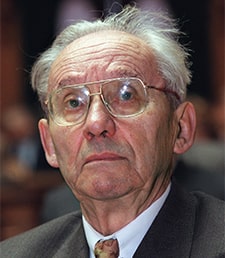Paul Ricoeur (1913 – 2005) is a renowned French philosopher of the 20th century whose work has been widely studied and commented on around the world. He was an accomplished academic and public speaker, and his prominence as a social and political commentator led to a square in Paris being named in his honor on the centenary of his birth.
Paul Ricoeur was born on February 27, 1913 in Valence, France. His mother died shortly thereafter and his father was killed in the Battle of the Marne in 1915, so Ricoeur and his sister were reared by their paternal grandparents and an unmarried aunt in Rennes. As a war orphan, his schooling was paid for by the French government. He first studied philosophy at the University of Rennes and then at the Sorbonne. Throughout his academic career, he was convinced that there is a fundamental, irreparable difference between things and human beings as persons and as agents.
Ricoeur was studying in Germany during World War II. Shortly after being called up for service in the French army in 1939, he was captured and spent the rest of the war in prison camps in Germany. There, he was able to study the work of Karl Jaspers and to prepare a translation of Husserl’s Ideas I in the margins of a book he had to conceal from his jailers.
After the war, he completed his doctorate and was appointed lecturer, then professor of the history of philosophy at the University of Strasbourg, where he succeeded Jean Hyppolite. He remained there until 1956, when he was named to the chair of general philosophy at the Sorbonne. In 1965, he joined the faculty of the new University of Paris at Nanterre, which had just been established to meet the growing demand for university education. He served as Dean of the Faculty of Letters for a difficult year following the student uprising of 1968.
Except for three years he then spent at Louvain, he continued to teach a seminar at the Husserl Archive in Paris until he reached the mandatory retirement age in 1980. Ricoeur also gave lectures in the United States and Canada starting in 1954. In 1970, he was named the John Nuveen professor of philosophical theology at the University of Chicago, with joint appointments in the Divinity School, the Philosophy Department, and the Committee on Social Thought. He taught there regularly for a portion of each year until 1992.
In the course of his long career he wrote on a broad range of issues. Ricoeur published over 500 essays, many of which have been collected in English collections. The Ricoeur Archive in Paris has made many of the original published works by Jacques Ricoeur available online. Some of Jean-Paul Ricoeur’s principal works include “Freedom and Nature: The Voluntary and the Involuntary” (1950), which is the first volume in his three-volume Philosophie de la volonté. (1950–60; Philosophy of the Will); Histoire et vérité (1955; History and Truth); Le Conflit des interprétations: essais d’herméneutique (1969; The Conflict of Interpretations: Essays in Hermeneutics).
Ricœur died on May 20, 2005, at his home in Châtenay-Malabry, France, of natural causes. French Prime Minister Jean-Pierre Raffarin declared that “the humanist European tradition is in mourning for one of its most talented exponents”.


